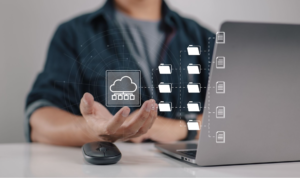Managing a business today demands tools that are not only efficient but also adaptable.
Cloud ERP systems have emerged as a critical solution, offering businesses the flexibility and accessibility they need.
Integrating artificial intelligence (AI) takes these systems to an entirely new level.
AI-powered Cloud ERP systems can significantly boost operational efficiency by enhancing automation, analytics, and decision-making.
NetSuite exemplifies this transformative potential with its innovative AI-driven features.
They’re not just keeping up with the times but setting the pace with innovative AI-driven solutions.
Explore AI-driven efficiency with NetSuite—schedule a demo and get a custom pricing estimate from Cumula 3 Group to see what’s possible.
ALSO READ:
→ NetSuite Enhancement Essentials: Add-On Guide
→ Why Going Without Warehouse Software Hits Your Bottom Line
The Evolution of Cloud ERP
In the early days, businesses relied on on-premises ERP systems. These systems required significant investment in hardware, software, and IT staff to maintain.
They were robust but rigid, often becoming outdated quickly and costly to upgrade.
The shift to cloud-based ERP was a game-changer as businesses moved away from the hefty expenses of maintaining physical servers and the constant need for upgrades.
Instead, they embraced the cloud, which offered flexibility and lower costs. This transition began a new era in how companies managed their operations.
Here are several key milestones that have defined the evolution of Cloud ERP:
- Introduction of SaaS: Software as a Service (SaaS) allows businesses to access ERP systems via the Internet. This model eliminates the need for on-site servers and makes ERP more accessible to small and medium-sized enterprises (SMEs).
- Mobile Access: As smartphones and tablets became more prevalent, ERP systems adapted. Mobile access allows employees to manage tasks on the go, increasing productivity and responsiveness.
- Integration Capabilities: Modern ERP systems can seamlessly integrate with other software, enhancing functionality and providing a unified platform for all business operations.
- AI Integration: The incorporation of AI marked the latest milestone. AI-enhanced Cloud ERP systems offer advanced analytics, automated workflows, and predictive insights, making them indispensable business tools.
Today, Cloud ERP systems are at the forefront of business technology, offering unmatched efficiency, scalability, and accessibility.
ERP tools are now available to businesses of all sizes without requiring large IT infrastructures.
Cloud ERP systems provide real-time data, which is crucial for making informed decisions.
They scale effortlessly to accommodate growing businesses and can be accessed from anywhere, ensuring that remote teams remain connected.
NetSuite exemplifies the current state of Cloud ERP. Its single-version platform ensures that all users benefit from the latest features and updates simultaneously.
This continuous improvement cycle allows businesses to leverage cutting-edge technology without the disruptions associated with traditional upgrades.
ALSO READ:
→ NetSuite Implementation Expenses Unveiled: Buyer’s Overview
→ Pre-Purchase Tips: Selecting Metal Fabrication Software
Role of AI in Cloud ERP
Artificial intelligence (AI) is transforming how businesses operate. At its core, AI involves machines learning from data and making decisions or predictions.
This technology can quickly process vast amounts of information, identify patterns, and predict future outcomes.
AI’s capabilities extend from simple task automation to complex data analysis and intelligent decision-making.
AI brings several critical enhancements to ERP systems:
- Automation: AI automates tasks like data entry, invoice processing, and inventory tracking, reducing errors and freeing employees for higher-value tasks.
- Advanced Analytics: AI-powered ERP systems process large datasets in real-time, identifying patterns and improving financial forecasting accuracy.
- Predictive Insights: AI helps businesses forecast inventory demand based on historical sales trends rather than purely market trends.
NetSuite is at the forefront of integrating AI into Cloud ERP.
With features like predictive analytics, automated workflows, and intelligent reporting, NetSuite helps businesses operate more efficiently and make smarter decisions.
ALSO READ:
→ Choosing Between NetSuite and Epicor: What You Need to Know
→ Easy Restaurant Inventory Management: NetSuite Solution
NetSuite’s Approach to AI-Enhanced Cloud ERP
NetSuite has firmly established itself as a leader in the Cloud ERP space by consistently delivering innovative solutions that cater to businesses’ dynamic needs.
Its cloud-based platform offers a comprehensive suite of tools to manage various business functions, including finance, accounting, supply chain, and customer relationship management.
What truly sets NetSuite apart is its proactive integration of AI technologies to enhance these functionalities, making the platform smarter and more efficient.
NetSuite has seamlessly incorporated several AI-driven features that significantly enhance its Cloud ERP capabilities:
1. Predictive Analytics
NetSuite’s AI-powered predictive analytics tools are designed to analyze historical data and forecast future trends.
This feature is handy for businesses looking to make proactive, data-driven decisions.
For instance, predictive analytics can help forecast sales trends, allowing companies to adjust their inventory levels and marketing strategies in advance.
This capability enables businesses to anticipate demand, optimize stock levels, and ultimately increase profitability.
2. Automated Workflows
Automation is at the heart of NetSuite’s AI integration.
By automating repetitive and time-consuming tasks, NetSuite’s AI frees up valuable time for employees to focus on more strategic activities.
Automated workflows can handle various financial processes, such as billing, collections, compliance tasks, supply chain operations, and order processing and inventory management.
This reduces the likelihood of human error and speeds up business processes, leading to greater efficiency and accuracy.
3. Intelligent Reporting and Insights
NetSuite leverages AI to generate detailed reports and actionable insights.
These intelligent reports go beyond traditional data analysis, highlighting key performance indicators and uncovering trends that might otherwise remain hidden.
For example, AI-driven insights can reveal patterns in customer behavior, helping businesses tailor their marketing efforts more effectively.
This level of insight allows companies to make more informed decisions, improve their strategies, and ultimately enhance their overall performance.
4. Intelligent Assistance
NetSuite’s platform includes AI-driven assistance features that help users navigate the system more effectively.
These intelligent assistants can provide recommendations, automate responses to common queries, and guide users through complex processes.
This improves user experience and ensures employees can utilize the system to its full potential without extensive training.
5. Advanced Security Features
NetSuite also uses AI to enhance security.
AI-driven security features can detect unusual behavior patterns, identify potential threats, and respond to security incidents in real-time.
This proactive approach to security helps protect sensitive business data and ensures compliance with industry regulations.
NetSuite’s Unique Advantage
One of NetSuite’s standout features is its commitment to maintaining a single version of its platform.
This approach ensures that all users benefit from the latest AI-driven features and updates simultaneously.
Unlike traditional ERP systems that may have multiple versions or require costly and disruptive upgrades, NetSuite’s single-version model offers several advantages:
- Continuous Improvement: With every user operating on the same platform version, NetSuite can focus its development efforts on enhancing a unified system. This means that new features, improvements, and AI capabilities are rolled out to all users simultaneously, ensuring everyone benefits from the latest advancements.
- Reduced Maintenance Costs: Businesses using NetSuite avoid the additional costs associated with maintaining on-premises servers and managing multiple software versions. It reduces the total cost of ownership and allows companies to allocate resources more efficiently.
- Accelerated Innovation: NetSuite’s single-version approach enables it to integrate new features and technologies quickly into its platform. Businesses can stay ahead of industry trends and leverage cutting-edge AI capabilities without the delays and disruptions typically associated with traditional ERP upgrades.
- Improved Support: A unified platform simplifies support and training. NetSuite’s support team can provide more effective assistance because they are familiar with a single system version. This leads to faster issue resolution and a better overall user experience.
NetSuite’s approach to AI-enhanced Cloud ERP optimizes business operations and ensures that companies remain agile and competitive.
Leveraging AI, NetSuite helps businesses increase efficiency, make smarter decisions, and achieve sustainable growth.
ALSO READ:
→ Cumula 3 Group Joins Esteemed List of Bob Scott’s Top 100 VARs 2023
→ Considerations for Manufacturing ERP Selection
Steps to Implement AI-Enhanced Cloud ERP
Implementing AI-enhanced Cloud ERP systems involves several critical steps, from assessing business needs to selecting the right provider and ensuring employee adoption.
A well-planned approach is essential to maximize the benefits of AI and ensure a smooth transition, and here’s how:
- Assessing Business Needs and Readiness: Before implementing AI-enhanced Cloud ERP, it’s crucial to evaluate your business’s specific needs and readiness for such a transformation. Conduct a thorough assessment of your current systems and processes to understand what gaps exist and how AI can address them.
- Selecting the Right ERP Provider: Choosing the right ERP provider is a critical step in the implementation process. Look for a provider with a strong track record of integrating AI into their ERP systems. Ensure that the provider’s solutions align with your business needs and offer the scalability required for future growth.
- Planning and Executing the Implementation Process: Develop a clear roadmap that outlines each phase of the implementation process, from initial setup to full deployment. Pilot tests are also essential to identify and resolve potential problems before full-scale deployment.
- Training Employees and Ensuring User Adoption: For AI-enhanced Cloud ERP systems to be effective, employees must be comfortable using them. Provide comprehensive training that covers both the technical aspects of the new system and its practical applications. Consider creating a support network of “super users” who can assist colleagues and share best practices.
- Continuous Monitoring and Optimization: Implementation doesn’t end once the system is up and running. Constant monitoring and optimization are crucial to ensuring long-term success. Regularly review system performance and user feedback to identify areas for improvement.
Implementing AI-enhanced Cloud ERP systems involves a series of well-planned steps: assessing business needs, selecting the right provider, meticulous planning and execution, comprehensive training, and ongoing optimization.
Following these steps, businesses can successfully integrate AI into their ERP systems, unlocking new levels of efficiency and insight.
ALSO READ:
→ Comparing NetSuite and Epicor: Which One’s Better for Your Business?
→ Your Essential NetSuite Account Reconciliation Handbook
Conclusion – The Future of Cloud ERP with AI
Cloud ERP can transform businesses through AI.
Businesses that embrace these technologies can expect significant improvements in operational efficiency, enhanced customer experiences, and reduced manual errors.
With leaders like NetSuite paving the way, integrating AI into your Cloud ERP system is more accessible than ever.
Incorporating AI into your ERP system isn’t just about keeping up with technology; it’s about driving your business forward, making smarter decisions, and providing better customer experiences.
Now is the time for businesses to explore and adopt AI-driven ERP solutions.
See NetSuite’s AI features in action—schedule a demo and get pricing details specific to your business from Cumula 3 Group.







